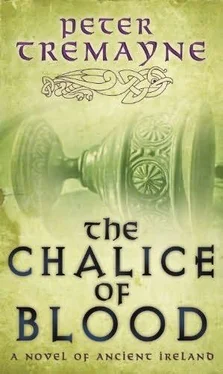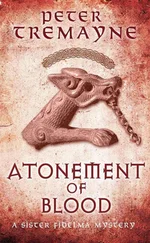Peter Tremayne - Chalice of Blood
Здесь есть возможность читать онлайн «Peter Tremayne - Chalice of Blood» весь текст электронной книги совершенно бесплатно (целиком полную версию без сокращений). В некоторых случаях можно слушать аудио, скачать через торрент в формате fb2 и присутствует краткое содержание. Жанр: Исторический детектив, на английском языке. Описание произведения, (предисловие) а так же отзывы посетителей доступны на портале библиотеки ЛибКат.
- Название:Chalice of Blood
- Автор:
- Жанр:
- Год:неизвестен
- ISBN:нет данных
- Рейтинг книги:5 / 5. Голосов: 1
-
Избранное:Добавить в избранное
- Отзывы:
-
Ваша оценка:
- 100
- 1
- 2
- 3
- 4
- 5
Chalice of Blood: краткое содержание, описание и аннотация
Предлагаем к чтению аннотацию, описание, краткое содержание или предисловие (зависит от того, что написал сам автор книги «Chalice of Blood»). Если вы не нашли необходимую информацию о книге — напишите в комментариях, мы постараемся отыскать её.
Chalice of Blood — читать онлайн бесплатно полную книгу (весь текст) целиком
Ниже представлен текст книги, разбитый по страницам. Система сохранения места последней прочитанной страницы, позволяет с удобством читать онлайн бесплатно книгу «Chalice of Blood», без необходимости каждый раз заново искать на чём Вы остановились. Поставьте закладку, и сможете в любой момент перейти на страницу, на которой закончили чтение.
Интервал:
Закладка:
By trotting and cantering over the flat plain they made goodtime in reaching the banks of the broad River Siúr where a settlement had risen around the ancient fortress appropriately named Cathair, the stone fort. Just south of here, Eadulf recalled, were caves in the limestone cliffs overlooking the river, in which he and Fidelma had sheltered on a journey back from the far west. It was there that he had been worried about Fidelma’s depressive moods following the birth of Alchú. And here the old road turned slightly to the south-east, following the banks of the Siúr towards the distant hills. They kept the river to their right before moving away to follow the old road through good, flat farming country before swinging back south-westerly to return to the barrier of the Siúr again. The hours sped by and no one spoke beyond an occasional remark on the scenery through which they passed.
It was time to rest and water the horses, and to eat something. Rath Ard dominated this area, the fortress seat of one of the powerful nobles of the Múscraige Breogáin. Gormán wondered if it was Fidelma’s intention to seek hospitality at the fortress. Fidelma replied that she preferred to press on rather than undergo the rituals of hospitality that would be undoubtedly forced on them and perhaps delay their journey by another day. For the same reason, she did not want to call at the nearby abbey that Fionán the Leper had established near the banks of the River Siúr which was named after him — Ard Fhionáin, Fionán’s Height.
The abbey stood by a natural ford across the river and a small settlement had sprung up around it. It was a good location, set in pleasant scenery and provided a base for traders coming upriver to transfer their goods to smaller barges or pack animals before coming to the more inaccessible reaches of the kingdom. But the ford had always presented a problem, for the currents were fairly strong. In fact, the abbey of Fionán provided a ‘watcher by the ford’ to ensure that no accident went unobserved. A bellhung ready to be rung to summon help if needed. But, as they rode beyond the abbey walls, both Fidelma and Eadulf were surprised to see a new bridge, its timbers hardly seasoned, now spanning the river.
‘It was only recently built,’ explained Gormán, when Eadulf commented on the fact. ‘The members of the abbey community built it.’
Fidelma did not seem to hear, her mind was occupied with other thoughts. In fact, she was reflecting that it was here, at this very spot, that she and Eadulf had first heard that their nurse Sárait had been murdered and their son Alchú had been kidnapped by the evil leper Uaman, Lord of the Passes of Sliabh Mis. Gormán had been in love with Sárait and was initially accused of her murder. She glanced anxiously at Gormán but there was no reason he would know of the connection. She wondered if Eadulf remembered and if he would mention it, but if he did remember, he gave no indication of it.
A tavern stood just before the new bridge. Gormán cleared his throat anxiously. He knew that Fidelma wanted to press on but they had been riding for some hours.
Fidelma took the hint; she realised that the horses did need watering. But she insisted that they did not stop long, only time enough to have their horses watered and to take food and drink in moderation for themselves.
They sat outside the inn, for the day was cloudless and warm. A stable lad attended to their horses while the innkeeper brought them their refreshments. The man had no other customers, so he remained with them and talked about the possibilities of a good harvest, the fine summer and the number of newcomers who were building their homes around the abbey. Fidelma was clearly impatient to continue the journey.
‘Is the bridge safe to cross?’ Eadulf inquired of the innkeeper as he was finishing his drink.
‘The bridge safe to cross?’ The innkeeper was a burly man, with balding head and slightly protruding eyes, and his jowls shook with laughter. ‘Bless you, Brother, an entire troop of the king’s horsemen could ride back and forth several times without disturbing one beam of it.’
‘I am not concerned with a troop of cavalry but only with my well-being,’ replied Eadulf dourly.
Before the conversation could be prolonged, Fidelma stood up and signalled to the stable lad to bring their horses. Gormán settled with the innkeeper and soon they were crossing the new bridge. Indeed, the bridge was built strongly, as it had to be, for the rushing waters of the Siúr beneath them pounded against its supports with alarming ferocity. The great sawn tree trunks on which the crossbeams rested had been driven deep into the river bed and there were about fifteen on each side. The width of it, like the Irish roads, according to Brehon Law, was broad enough to take two carriages, with room to spare between them. It was an easier crossing than last time, Eadulf remembered, when he had had to ford the rushing waters on horseback.
‘Well, a bridge certainly makes the old roadway easier to traverse,’ Fidelma observed. ‘We should make better time now.’
In fact, it was hardly any time before they came to the next natural obstacle across the track. This was a smaller river called the Teara, a tributary of the Siúr that they had just crossed. The ford here was easy, for there was an island in the middle of the river that divided it into two small crossings.
‘This is where they say the road took its name,’ Gormán suddenly said, tired of the silence of their journey.
‘I have travelled this road several times,’ Eadulf replied, ‘and never once worked out why it is called the “Track of Patrick’s Cow”.’
‘Why it is called Rian Bó Phádraig?’ Gormán hesitated and glanced at Fidelma. ‘There is an old legend.’
‘You may as well tell it,’ she invited. She had heard the legend before.
‘Well, the old folk say that the Blessed Pádraig, who helped bring the Faith especially to the northern kingdoms, had a cow and this cow had a calf. The cow and her calf were peacefully grazing on the banks of the Teara, this very river we are crossing. The story is that a thief from near Ard Mór stole the calf. The cow was consumed with anger at the loss of her calf and chased the thief all the way across the mountains to Ard Mór, and its tracks made this road.’
Eadulf pursed his lips sceptically.
‘But doesn’t this road lead from Cashel to Lios Mór?’ he pointed out in pedantic fashion.
‘And continues all the way on to Ard Mór,’ Gormán added, with a grin at his puzzled companion.
‘It is a legend,’ Fidelma intervened impatiently. ‘It is not to be taken literally. The road is far older than the time of the Blessed Pádraig. It joins the Slíge Dalla, the Way of the Blind, at Cashel, which, as you recall, is one of the five great roads that lead to Tara. There is no way of knowing why legends come about. The Blessed Ailbe converted our kingdom to the new Faith long before Pádraig arrived here and before Declan built his abbey at Ard Mór. Why would Pádraig have a cow grazing on the banks of the Teara River of all the rivers in Ireland? It makes no sense.’
‘Legends,’ Gormán solemnly announced, ‘are often the result of half-understood events, or events that have become embroidered out of all proportion by their retelling.’
‘Yet they are usually founded in truth,’ observed Eadulf.
‘The question is, how do you find that truth?’ Fidelma retorted.
‘Doesn’t the legend become its own truth?’ asked Gormán.
Eadulf chuckled. ‘You are becoming a philosopher, Gormán.’
The young warrior turned to him and, without warning, lungedforward, knocking Eadulf off his horse with a single blow of his hand. As he fell, Eadulf was aware of a curious whistling sound in the air. Something thudded into a tree just behind his horse. Gormán yelled to Fidelma to take cover and at the same time drew his sword. He urged his cob forward towards a group of trees a short distance away along the side of the highway.
Читать дальшеИнтервал:
Закладка:
Похожие книги на «Chalice of Blood»
Представляем Вашему вниманию похожие книги на «Chalice of Blood» списком для выбора. Мы отобрали схожую по названию и смыслу литературу в надежде предоставить читателям больше вариантов отыскать новые, интересные, ещё непрочитанные произведения.
Обсуждение, отзывы о книге «Chalice of Blood» и просто собственные мнения читателей. Оставьте ваши комментарии, напишите, что Вы думаете о произведении, его смысле или главных героях. Укажите что конкретно понравилось, а что нет, и почему Вы так считаете.











